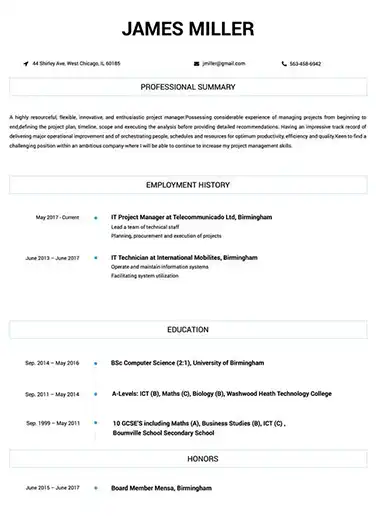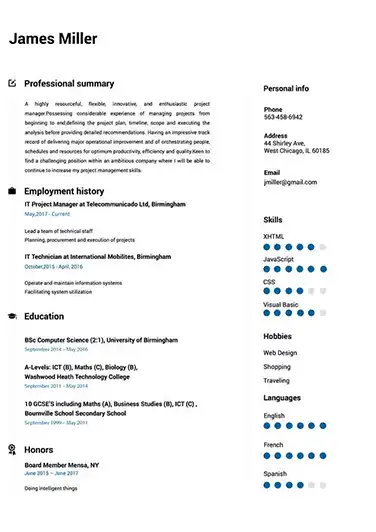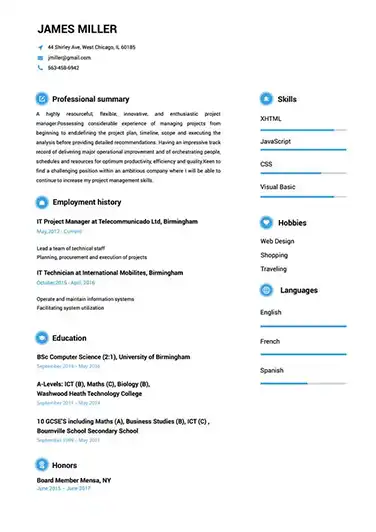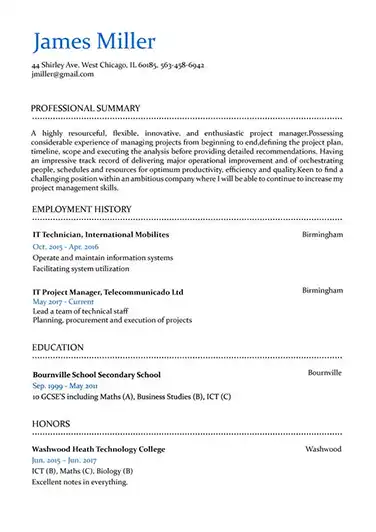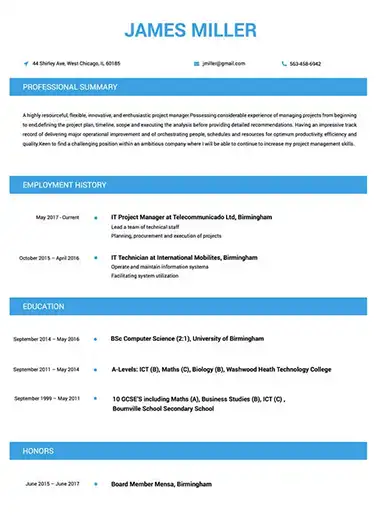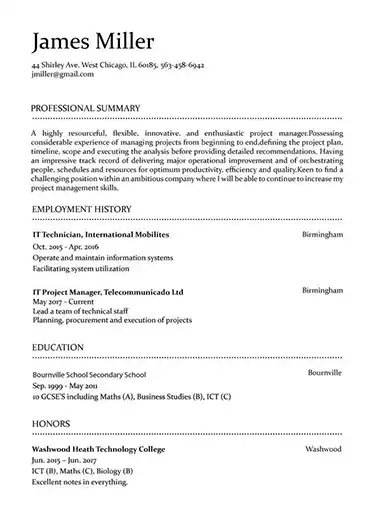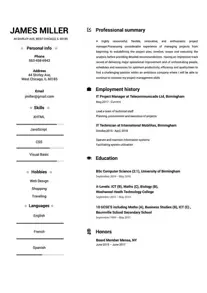 Use This Template
Use This Template
Build your resume in 15 minutes
Create an awesome resume that meets the expectations of potential employers with our selection of professional, field-tested resume templates.
real estate agent: Resume Samples & Writing Guide
ingram-jonathan@mail.com
833-711-2714
Employment history
- Develop networks and cooperate with other agents to buy and sell properties
- Follow up with clients after a sale to ensure satisfaction
- Maintain accurate records of all real estate transactions
- Prepare and present purchase offers to sellers
- Educate clients on the current real estate market and local trends
- Assist buyers in finding suitable properties
- Assist buyers in finding suitable properties
- Maintain accurate records of all real estate transactions
- Build relationships with clients and provide excellent customer service
Education
Skills
Do you already have a resume? Use our PDF converter and edit your resume.
robertswalter@hotmail.com
899-811-5465
Employment history
- Develop a competitive market analysis to establish property values
- Follow up with clients after a sale to ensure satisfaction
- Monitor local economic conditions to determine the best investment opportunities
- Utilize marketing and advertising strategies to promote properties
- Remain knowledgeable of current real estate market trends
- Analyze market data to determine the best listing price for a property
- Develop a competitive market analysis to establish property values
- Negotiate real estate transactions
- Handle all necessary paperwork for real estate transactions
Education
Skills
adamingram@protonmail.com
797-807-0562
Employment history
- Develop a competitive market analysis to establish property values
- Maintain accurate records of all real estate transactions
- Follow up with clients after a sale to ensure satisfaction
- Build relationships with clients and provide excellent customer service
- Maintain accurate records of all real estate transactions
- Monitor local economic conditions to determine the best investment opportunities
- Assist buyers in finding suitable properties
- Manage property showings and open houses
- Remain knowledgeable of current real estate market trends
Education
Skills
ingram.mike@outlook.com
720-891-3165
Employment history
- Manage property showings and open houses
- Remain knowledgeable of current real estate market trends
- Build relationships with clients and provide excellent customer service
- Assist buyers in finding suitable properties
- Monitor local economic conditions to determine the best investment opportunities
- Utilize marketing and advertising strategies to promote properties
- Remain knowledgeable of current real estate market trends
- Develop a competitive market analysis to establish property values
- Follow up with clients after a sale to ensure satisfaction
Education
Skills
pauline_smith@outlook.com
639-454-2300
Employment history
- Develop a competitive market analysis to establish property values
- Maintain accurate records of all real estate transactions
- Analyze market data to determine the best listing price for a property
Education
Skills
Not in love with this template? Browse our full library of resume templates
You don’t need us to tell you that the real estate agent job market is cutthroat. Between the larger agencies and more independent agents than you can count, finding a way to stand out is more challenging than selling the worst fixer upper.
While developing your real estate skills and experience is helpful, you need to land your next job now. That’s why the best way to get a leg up fast is to step up your resume game.
We’ve got good news! There are some key real estate agent resume tricks that your competition is probably missing. In this guide, we’ll break down all the key things you need to do to get hired at even the most competitive real estate agency.
This guide will show you
- Useful real estate agent resume examples
- Tips on formatting your resume for maximum impact
- An overview of the most important sections to include
- An explanation of how Applicant Tracking Systems work and how your resume can get past them
- A deep dive into the psychology of a recruiter in the real estate space and how you can appeal to them
- Which certifications and trainings recruiters are looking for from real estate agents
- Which soft and hard skills you’ll want to include on your resume
- How to choose between a resume summary and objective (plus how to write both with examples)
- How to craft the perfect real estate agent resume if you have little or no experience (with examples)
- How to make your resume stand out from the competition
- And more!
Before you start feeling overwhelmed, we’ve broken this guide into helpful sections so it’s easy for you to check back on any section you need. That blank page might seem intimidating now, but we’re going to start with some examples so you can get a feel for what you’ll be creating.
Real estate agent resume template examples
The best place to start when you’re creating a resume is with examples. Whether you’ve got decades of experience in real estate or are just getting started, you probably don’t have a good sense of what other real estate agent resumes look like.
So start by looking through these examples and take notes about what you like and don’t like about each. This way you’ll start with a set of ideas instead of a white screen. Also think about these examples as competition, how can you stand out from other resumes like these? Consider what will set you apart.
[Examples]
How to write a real estate agent resume that tells a compelling story
Now that you’ve got some inspiration, let’s begin with the fundamentals of creating a real estate agent resume that will get you hired. The first lesson to take is that a resume is more than just a list of facts in the same way a piece of real estate is.
You don’t sell a house just based on the size, number of bedrooms, type of backsplash, etc. A house is sold by the story it tells, by appealing to the buyer’s emotions just as much as their brain. That’s why your resume needs to tell a story. But before you worry about how on earth you’ll do that, we’ll explain everything you need to do throughout this guide.
Next, once you’ve got a feel for how your resume can tell your story, you need to understand the audience for that story.
Start with understanding your audience
Who’s actually going to read your resume? A shockingly small number of people ever ask that question. But creating one without answering it would be as crazy as trying to sell a property without ever thinking about who the buyer might be. Understanding your audience is key to success here. So let’s walk through the two audiences you need to be thinking about.
How to bypass ATS
Unless you’re applying to a small real estate agency, there’s a good chance the first audience for your resume won’t even be human. These systems are currently used by 98% of Fortune 50 companies, 66% of large companies, and 35% of small companies. In other words, not having an ATS optimized resume is a gamble even if you’re applying at a smaller agency.
Why are these tools so popular? The idea is to weed out all the resumes that don’t match the criteria. In other words, to not waste a recruiter’s time reading resumes that will go straight into the trash anyways. But, these systems aren’t perfect, so it’s essential that you understand how they work, to make sure you make it past them.
While every ATS works a little differently (and there are dozens of them on the market), at their core they use artificial intelligence to scan your resume for key words and information. For example, if the job requires 4 years of experience as a real estate agent or a specific certification, the system will try to filter out resumes without those things.
What you need to do to get past ATS is:
- Make sure your resume format is ATS-friendly. This means submitting a .doc, .docx, or .pdf file in most cases. Otherwise, if the ATS can’t read your resume it’s likely to get discarded immediately.
- Study the keywords in the job description and include as many of them on your resume as possible. Be sure to word them the same way to ensure the ATS doesn’t misunderstand what you’ve written.
- Make sure you meet the requirements. If the job ad says you need to be a Certified Real Estate Brokerage Manager (CRB), then make sure that you are. Otherwise, you’re probably wasting your time.
Now that you’ve got a sense for what will get you past ATS, let’s go over your second audience: the recruiter.
How to give recruiters what they’re looking for
Once your resume has gotten past ATS, it still needs to convince a recruiter that you’re the right real estate agent for the job. Again, you need to approach this by thinking about your resume as a piece of real estate and the recruiter as your ideal buyer. Everything about your resume needs to be tailored to appeal to them, from how it’s formatted, to how you phrase your achievements.
Fortunately, many of the same things you already did to get past ATS will also help your resume appeal to a recruiter. Everything else you read in the rest of this guide will also help you tailor your resume for a recruiter. But overall, the key is to put yourself in their shoes.
A recruiter is interested in hiring the best agent possible. But they also want the easiest route to do that. So, for example, if your resume is 4 pages long, the first reaction from the recruiter will probably be “ugh, I have to read 4 pages of text, why couldn’t they fit it into 1 or 2?” Or, if you used some strange font/formatting they might think “I can barely read this!”
In either case, right from the first moment you’re annoying the recruiter. In other words, your resume should make it as easy as possible for them to say “yes” to you. Make their job easy and they’ll view you positively.
How should you format your real estate agent resume?
Before you start writing anything, you need to have a sense of your resume’s format. The template examples above should give you some ideas, but there are also a few principles you need to keep in mind.
First, the most important information should go at the top. That’s why your real estate agent resume should be reverse chronological, meaning your most recent work experience goes at the top. This ties back to making things easy for a recruiter. The most important information they need to see should be at the top, so they can quickly get a general feel for you as a candidate.
What should be at the top of your resume?
One obvious choice is an excellent headshot. Every real estate agent needs to be able to project confidence and success in a photo, so you can demonstrate this on your resume. That said, some places do have laws against photos on a resume, so be sure to check the applicable rules.
Otherwise, many people will top their resume with information like their address. But ask yourself, is that the most important information for a recruiter to see? Absolutely not. There are few cases they would ever need to know your address at this stage, so you’re wasting valuable space with useless information. Instead, an objective or summary will work best (more on how to write those below).
What are the most important sections to include?
First, one caveat. The sections you include on your real estate agent resume need to be tailored for you. Remember it’s all about selling yourself to your audience, so that’s what should decide which sections you add. That said, these are the sections you should consider adding:
- Resume objective
- Resume summary
- Work experience
- Certifications
- Achievements
- Education
- Hard skills
- Soft Skills
- Languages
- Volunteering
- Hobbies/interests
Now, we’ll break down exactly how you can make these sections the most effective.
How to list additional training and certifications as a real estate agent
This is easily one of the most impactful sections on any real estate agent resume. Training and certifications show two key things. First, they provide hard evidence that you have critical knowledge and skills. Second, they show that you went above and beyond by obtaining those certifications.
For less experienced agents, this is particularly important. You may not be able to magically obtain years of more experience in real estate, but you can obtain valuable training and certifications in just a few months. These can even the playing field when a recruiter is comparing you to a more experienced candidate. All that is to say, this is a great section to put effort into.
Here are some certifications you should consider (from the National Association of Realtors, NAR):
- Accredited Buyer's Representative / ABR®
- Accredited Land Consultant / ALC
- Certified Commercial Investment Member / CCIM
- Certified International Property Specialist / CIPS
- Certified Real Estate Brokerage Manager / CRB
- Certified Residential Specialist / CRS
- Counselor of Real Estate® / CRE®
- General Accredited Appraiser / GAA
- NAR's Green Designation / GREEN
- Graduate, REALTOR® Institute / GRI
- Performance Management Network / PMN
- REALTOR® Association Certified Executive / RCE
- Residential Accredited Appraiser / RAA
- Seller Representative Specialist / SRS
- Society of Industrial and Office REALTORS® / SIOR
- Seniors Real Estate Specialist® / SRES®
Your training and certifications section should include the year you obtained each one as well as the organization which granted it. For example:
General Accredited Appraiser, National Association of Realtors, 2016
How to choose which hard and soft skills to include
Anyone can list skills, but a great real estate agent resume will really show that you possess them. So your first challenge is to choose the right skills to list. Then, you need to find ways to demonstrate those skills as much as possible.
In general, the best skills to list will always be the ones asked for in the job ad. You should already have a list of all the hard and soft skills mentioned in the job ad from your ATS optimization. This is where you need those skills to be listed. Once your resume has made it to a recruiter, you want them to be able to quickly scan your skills and say “they’re perfect!”
However, besides skills specifically mentioned in a job ad, there are still some skills that are broadly in demand for real estate agents. Here are two lists of hard and soft skills you should consider adding if they apply to you (or obtaining if you have the ability).
The best hard skills to include on your resume
- Risk analysis / due diligence
- Title, escrow, and deed search
- MLS
- Languages
- Knowledge of local and state regulations
- Property management software
- Photography
- Familiarity with the local area
The best soft skills to include on your resume
- Negotiation and mediation
- Problem solving
- Charisma
- Networking
- Sales
How to highlight your most important achievements
We just talked about how important it is to back up your skills whenever possible. There are three key places where you can do this: certifications, work experience, and achievements. Certifications are straightforward, but now let’s go over how to demonstrate skills in an achievements section or in your work history.
But first, you may not be familiar with an achievements section. It’s an ideal place to list things you’ve achieved outside of the workplace that still might be relevant to your work as a real estate agent. This section can have a tremendous impact, because it offers you the chance to show personality, skills, and make your resume more memorable overall. Let’s look at some examples to see how to get achievements just right:
“Sold the most girl scout cookies in my troop during the 2009 season.”
While sales skills are highly relevant, this example just makes you sound childish. It’s too old and puts you in a bad light, so leave it out.
“Helped sell artwork for a charity event.”
This example could be great. Charity work always makes you look like a solid and reliable candidate and sales skills are important. But this example is just too vague to mean very much. It should include some more tangible details about what you did to help, what was sold, and the nature of the charity event.
“Created and ran an apartment subletting website at my university, designing the website, taking the photographs, and ultimately helping an average of 100+ students find summer sublets from 2016-2018.”
This example is excellent. True, it’s from university, but it’s recent enough to be relevant. It also shows self-motivation, web design, networking, photography, and a general sense for matching customers with sellers in a market. In other words, in just 29 words this example demonstrates a whole range of highly relevant real estate skills.
How to write a resume objective or summary that hooks recruiters
As mentioned above, one of the best sections to include at the top of your resume is an objective or summary. But what’s the difference and which one should you use?
A resume objective is a short sentence or two simply stating what you aim to achieve. It’s an ideal choice if your experience for the real estate agent position is fairly standard and doesn’t require much explanation.
On the other hand, if your experience isn’t as self explanatory or there’s some other element of your resume that needs to be explained, a summary is best. A resume summary will generally be a bit longer, more of a paragraph. Let’s look at some examples to see how each should be written.
Real estate agent resume objective
A resume objective should be short, to the point, and packed with relevant information. It’s generally the first thing a recruiter will read so it sets the stage for the rest of your resume. This is your first impression, so think about what conclusions they will draw from it. Here are some examples:
“I’m an experienced real estate agent with all the qualifications to work at your agency.”
This is too vague. When a recruiter reads this, it tells them that this is a cookie-cutter resume sent to many agencies (because the name wasn’t mentioned) and that you don’t seem to possess any real sales skills. Compare that to this next objective example:
“Spanish speaking lifelong resident of Springfield with SRS certification looking for an agent position at Springfield Real Estate LLC.”
This objective tells you a lot in a few words, immediately giving you a sense of the candidate, their background, and why they would be a good fit. It also specifically mentions the company they’re applying to, indicating this is a customized resume (more on why that’s important below).
Real estate agent summary
Summaries are ideal if you’re making a career change, have a gap in your work experience, or simply have some other element of your resume you’d like to explain. They’re also a fantastic place to demonstrate that you can tell a compelling story that sells you as a candidate. So, for real estate agents, the bar is set quite high. Here are some examples to show you what yours should (and shouldn't) look like:
“I may not have very much experience in real estate, but the work I did in sales shows that I can excel in this career. In particular, my high sales numbers from 2018 show I understand the kind of customers you need to reach. Please review my resume and feel free to contact me if you have any questions.”
There are a few problems here. This summary is vague, it sounds unprofessional (you generally want to avoid speaking in the first person on your resume), and it wastes time asking the recruiter to do their job. Overall, this summary makes a poor first impression.
“4 years of experience in the top 5% of representatives selling luxury vacation packages, looking to change careers and apply those sales skills and customer knowledge to selling luxury real estate for Springfield Luxury Real Estate. Actively pursuing an RAA certification.”
This summary tells the reader why you’re making a career change and exactly how your experience has prepared you for it. It also shows that you’re actively pursuing a relevant certification. Lastly, mentioning the specific company you’re applying for here tells the recruiter you took the time to personalize your resume. Overall, this summary tells a recruiter that you’re dedicated, get to the point, have relevant skills, and are self-motivated.
How to write a real estate agent resume when you have limited (or no) experience?
The good news is, many large brokerage firms have extensive in-house training and are willing to hire candidates with little or no real-estate experience. So the first thing to do is focus more on larger firms that will have the resources to train you.
Then, start obtaining training or certifications on your own. This will go a long way towards showing that you’re serious, eager, and self-motivated enough to succeed. Using a summary to explain why you’re trying to become a real estate agent will also help. You can also try starting in a more junior position in a real estate company before working your way up.
Lastly, find ways to show you have relevant skills in your work experience and achievements as detailed in the sections above. For example:
“Negotiated contracts with vendors”
Can be turned into:
“Led biannual contract negotiations with 4 primary vendors, obtaining a 16% cost decrease by agreeing to a new payment schedule.”
By being more specific, your previous work experience is far more impactful, even if you’re never worked in real estate.
How to make your resume stand out from the competition?
To summarize the advice of this guide, standing out from the competition comes down to:
- Having a clean resume design that doesn’t distract from the content.
- Putting an impactful objective or summary at the top.
- Crafting your skills based on the job ad.
- Being specific about your achievements.
- Including relevant certifications.
Together, nailing this 5 things will put you in an excellent position to land the real estate agent job you want.
How Resumebuild.com helps you create the perfect real estate resume
The last thing you need to create a real estate resume is a powerful resume builder. These days, a basic resume created in Word isn’t likely to make a strong impression. As a prospective real estate agent, you need to be able to sell yourself and a well-crafted real estate resume template will help you do that.
You also need a resume builder that is ATS-optimized to ensure you make it to a recruiter. The last thing you need is to spend the time to create a real estate agent resume only to discover it can’t make it past the ATS of a company you’re applying to.
Resumebuild.com makes this whole process easy. Simply browse through the array of professionally-developed templates, fill out your information based on our guide, and print or save the results. Now you’ve got a stunning, ATS-friendly, and well optimized resume that’s sure to delight recruiters.
real estate agent Job Descriptions; Explained
If you're applying for an real estate agent position, it's important to tailor your resume to the specific job requirements in order to differentiate yourself from other candidates. Including accurate and relevant information that directly aligns with the job description can greatly increase your chances of securing an interview with potential employers.
When crafting your resume, be sure to use action verbs and a clear, concise format to highlight your relevant skills and experience. Remember, the job description is your first opportunity to make an impression on recruiters, so pay close attention to the details and make sure you're presenting yourself in the best possible light.
real estate agent
- Advise clients on prices, mortgages, and legal requirements.
- Promote sales of properties through advertisements, open houses, and participation in multiple listing services.
- Prepare documents such as representation contracts, purchase agreements, closing statements, deeds and leases.
- Answer clients’ questions regarding construction work, financing, maintenance, repairs, and appraisals.
- Review plans for new construction with clients, enumerating and recommending available options and features.
real estate agent
- Accompany buyers during visits to and inspections of property, advising them on the suitability and value of the homes they are visiting.
- Contact property owners and advertise services to solicit property sales listings.
- Arrange for title searches to determine whether clients have clear property titles.
- Display commercial, industrial, agricultural, and residential properties to clients and explain their features.
- Review property listings, trade journals, and relevant literature, and attend conventions, seminars, and staff and association meetings to remain knowledgeable about real estate markets.
- Coordinate appointments to show homes to prospective buyers.
- Advise sellers on how to make homes more appealing to potential buyers.
junior real estate agent (leasing of commercial properties)
- Met with prospective lessors to show properties, explained rental terms, and provided information about local areas.
- Acted as liaison between on-site managers, owners and lessors.
- Maintained leasing records and property availability.
- Marketed vacant space to prospective lessors through calls.
- Met with clients to negotiate service contracts, determine priorities, and discuss the financial aspects.
- Negotiated short- and long-term leasing of commercial properties.
real estate agent
- Clean common areas, change light bulbs, and make minor property repairs.
- Meet with clients to negotiate management and service contracts, determine priorities, and discuss the financial and operational status of properties.
- Contract with architectural firms to draw up detailed plans for new structures.
- Develop networks of attorneys, mortgage lenders, and contractors to whom clients may be referred.
real estate agent
- Rent properties.
- Market vacant space to prospective tenants through advertising.
- Conduct seminars and training sessions for sales agents to improve sales techniques.
- Arrange meetings between buyers and sellers when details of transactions need to be negotiated.
real estate agent Job Skills
For an real estate agent position, your job skills are a key factor in demonstrating your value to the company and showing recruiters that you're the ight fit for the role. It's important to be specific when highlighting your skills and ensure that they are directly aligned with the job requirements, as this can greatly improve your chances of being hired. By showcasing your relevant skills and experience, you can make a compelling case for why you're the best candidate for the job.
How to include technical skills in your resume:
Technical skills are a set of specialized abilities and knowledge required to perform a particular job
effectively. Some examples of technical skills are data analysis, project management, software proficiency,
and programming languages, to name a few.
Add the technical skills that will get hired in your career
field with our simple-to-use resume builder. Select your desired resume template, once you reach the skills
section of the builder, manually write in the skill or simply click on "Add more skills". This will
automatically generate the best skills for your career field, choose your skill level, and hit "Save &
Next."
- Data Analysis
- Computer Literacy
- Technical
- Project Management
- Quality Assurance
- Troubleshooting
- Database Management
- Risk Management
- Social Media
- Presentation
- Written Communication
- Customer Service
- Financial Management
- Visualization
- Business Acumen
- Process Improvement
- Relationship Management
- Innovation
- Accounting
- Reporting
How to include soft skills in your resume:
Soft skills are non-technical skills that relate to how you work and that can be used in any job. Including
soft skills such as time management, creative thinking, teamwork, and conflict resolution demonstrate your
problem-solving abilities and show that you navigate challenges and changes in the workplace
efficiently.
Add competitive soft skills to make your resume stand-out to recruiters! Simply select
your preferred resume template in the skills section, enter the skills manually or use the "Add more skills"
option. Our resume builder will generate the most relevant soft skills for your career path. Choose your
proficiency level for each skill, and then click "Save & Next" to proceed to the next section.
- Communication
- Interpersonal
- Leadership
- Time Management
- Problem Solving
- Decision Making
- Critical Thinking
- Creativity
- Adaptability
- Teamwork
- Organization
- Planning
- Public Speaking
- Negotiation
- Conflict Resolution
- Research
- Analytical
- Attention to Detail
- Self-Motivation
- Stress Management
- Collaboration
- Coaching
- Mentoring
- Listening
- Networking
- Strategic Thinking
- Negotiation
- Emotional Intelligence
- Adaptability
- Flexibility
- Reliability
- Professionalism
- Computer Literacy
- Technical
- Data Analysis
- Project Management
- Customer Service
- Presentation
- Written Communication
- Social Media
- Troubleshooting
- Quality Assurance
- Collaboration
- Supervisory
- Risk Management
- Database Management
- Training
- Innovation
- Documentation
- Accounting
- Financial Management
- Visualization
- Reporting
- Business Acumen
- Process Improvement
- Documentation
- Relationship Management.
How to Improve Your real estate agent Resume
Navigating resume pitfalls can mean the difference between landing an interview or not. Missing job descriptions or unexplained work history gaps can cause recruiters to hesitate. Let's not even talk about the impact of bad grammar, and forgetting your contact info could leave your potential employer hanging. Aim to be comprehensive, concise, and accurate.
Employment history
- Develop networks and cooperate with other agents to buy and sell properties
- Assist buyers in finding suitable properties
- Monitor local economic conditions to determine the best investment opportunities
- Educate clients on the current real estate market and local trends
- Analyze market data to determine the best listing price for a property
- Build relationships with clients and provide excellent customer service
- Handle all necessary paperwork for real estate transactions
- Analyze market data to determine the best listing price for a property
- Monitor local economic conditions to determine the best investment opportunities
Education
Skills
Provide your Contact Information and Address Year Gaps
Always explain any gaps in your work history to your advantage.
Key Insights- Employers want to know what you've accomplished, so make sure to explain any gaps using a professional summary.
- Adding extra details and context to explain why you have a gap in your work history shows employers you are a good fit for the position.
How to Optimize Your real estate agent Resume
Keep an eye out for these resume traps. Neglecting to detail your job roles or explain gaps in your career can lead to unnecessary doubts. Grammar blunders can reflect negatively on you, and without contact information, how can employers reach you? Be meticulous and complete.
derekpeters@yandex.com
822-853-4172
Employment history
- Reamain knowledgable of currrent real-estate market trends.
- Maintane accurat records of all real estat transactions.
- Handel all neccesary paperwrok for real estate transactoins.
- Develp a competitve market analylsis to estabish propery values.
- Mointor local econimic condtions too determain the best investement oppertunities.
- Develp networs an cooperate wit othr agents too buy an sell properites.
Education
Skills
Include Job Descriptions and Avoid Bad Grammar
Avoid sending a wrong first impression by proofreading your resume.
Key Insights- Spelling and typos are the most common mistakes recruiters see in resumes and by simply avoiding them you can move ahead on the hiring process.
- Before submitting your resume, double check to avoid typos.
real estate agent Cover Letter Example
A cover letter can be a valuable addition to your job application when applying for an real estate agent position. Cover letters provide a concise summary of your qualifications, skills, and experience, also it also gives you an opportunity to explain why you're the best fit for the job. Crafting a cover letter that showcases your relevant experience and enthusiasm for the Accounts Payable role can significantly improve your chances of securing an interview.
Ingram ingram-jonathan@mail.com
833-711-2714
903 Pine Valley Road, Manawa, WI
54949
Sotheby's International Realty
Los Angeles, California
Sotheby's International Realty Hiring Team
I am a results-driven Real Estate Agent with 8 years of experience in Real Estate. I am excited to submit my application for the Lead Real Estate Agent role at Sotheby's International Realty, where I believe I can make a valuable contribution to your team.
As someone who has always been committed to making a positive impact on the world, I have pursued opportunities to contribute to my community through my work wherever I may be. My experience in this field has equipped me with the skills and knowledge necessary to succeed throughout my life and I am confident that they will help me to bring my passion and expertise to your organization and help drive your success.
I appreciate the opportunity to apply for the Lead Real Estate Agent position. I am confident that I can make a valuable contribution to your organization and that together there is no challenge that we cannot overcome. I will be waiting, hopeful for what the future will bring.
Thank you for your time,
Jonathan Ingram
833-711-2714
ingram-jonathan@mail.com
Jonathan Ingram
Showcase your most significant accomplishments and qualifications with this cover
letter.
Personalize this cover letter in just few minutes with our user-friendly tool!
Related Resumes & Cover Letters

Build your Resume in 15 minutes
Create an awesome resume that meets the expectations of potential employers with our selection of professional, field-tested resume templates.

